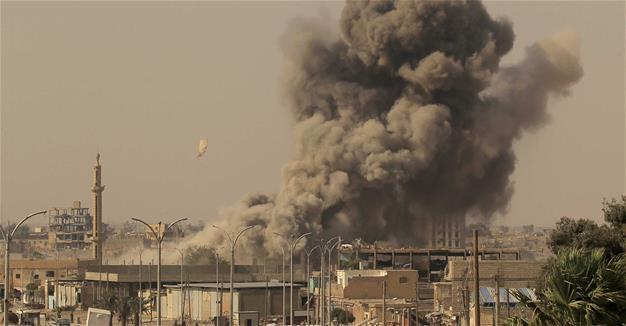Outgoing anti-ISIL commander in Iraq says US will continue with YPG after Raqqa operation
Cansu Çamlıbel – WASHINGTON
 Outgoing army Lieutenant General Stephen Townsend, the Iraq-based commander of the U.S.-led coalition against the Islamic State of Iraq and the Levant (ISIL), has made it clear that Washington will continue to cooperate with the Syrian Kurdish People’s Protection Units (YPG) inside the Kurdish-Syrian Arab alliance Syrian Democratic Forces (SDF) in its bid to sweep jihadists from the Middle Euphrates River Valley during the final stand.
Outgoing army Lieutenant General Stephen Townsend, the Iraq-based commander of the U.S.-led coalition against the Islamic State of Iraq and the Levant (ISIL), has made it clear that Washington will continue to cooperate with the Syrian Kurdish People’s Protection Units (YPG) inside the Kurdish-Syrian Arab alliance Syrian Democratic Forces (SDF) in its bid to sweep jihadists from the Middle Euphrates River Valley during the final stand.Speaking at his final teleconference call from Baghdad to a group of journalists in Washington, Townsend said the final stand of ISIL would be in the Middle Euphrates River Valley from Syria’s Deir al-Zor province down to Iraq’s Rawa, spanning over 250 kilometers and SDF will be a part of the operation, answering a question over the course of future prospects in the region.
“And you mentioned a Kurd force, but the Syrian Democratic Forces comprise of about 50,000 fighters, half of whom are Arabs. And what I’ve watched with this force is that they, first of all, solicit volunteers and recruits from the area to be liberated and they form the leading elements of the force from those people.
So I think that they will—they will do this much in the same way they are doing it in Raqqa. They will recruit people from the Deir ez-Zor province in the Middle Euphrates River Valley, and they will be part of the campaign. And I am reasonably confident, based on past history that they will find a force—they will make a force that is acceptable to the people down there.” Townsend said, citing their previous experience in Manbij, Tabqa and currently in Raqqa.
“You have to remember that the Syrian Democratic Forces are not the Iraqi Security Forces. They do not have tanks, helicopters or fighter jets. They are really an irregular light infantry force with a comparative handful of light armored vehicles and heavy weapons, who, with coalition assistance, are fighting well above the weight class. They have been and remain the most effective counter-ISIS fighting force in Syria,” he said, stressing Washington was also having a conversation with Moscow to de-conflict the region.
Townsend also added that the situation in Manbij was quiet for around 10 days after Turkey took “appropriate measures” to prevent further clashes between the Ankara-backed Free Syrian Army (FSA) fighters and coalition soldiers.
“So we actually have not had these clashes that you are referring to now in probably—I think, about 10 days or so. And what we were seeing about two weeks ago were some of the Free Syrian Army opposition—Syrian opposition fighters in the area controlled by the Turkish military, were firing upon the Manbij area there, where there are some U.S. forces—coalition forces there. We identified this to our Turkish allies—our NATO allies, Turkey, and they have, I think, taken the appropriate measures to get that under control,” Townsend said.
“Turkey is a member of the coalition. They’ve been a valuable member—valuable partner in the fight against ISIS in—particularly in northern Syria, where they liberated, with Syrian partner forces, a significant chunk of northern Syria, to include the iconic capital of the ISIS caliphate, Dabiq, and the city of al-Bab, just to mention a few places. So Turkey’s done great work with the coalition, and I think that they have gotten that under control, and I think we had some opposition units—elements there on their side that were kind of acting on their own, and I believe it has gotten—it has been put under control now, and we—like I said, it has been quiet now for, I think, about 10 days, maybe a little longer,” he said.
On the long-term U.S. presence in Iraq as a part of the post-ISIL vision, Townsend stated he was not in favor of withdrawing completely, citing the situation in 2011 as an example.
“As far as a longer-term presence here, I think there is a desire—I know that there is a desire for that on the part of the Iraqi government and the Iraqi Security Forces. And our government has engaged in conversations with the Iraqi Security Forces, and I am hopeful that an arrangement will be made to that end in the future. I think that, you know, we saw what happened—we all saw what happened in 2011 when we parted ways completely. And personally, I—my personal view is I don’t want to—I would not want to repeat that. So, I think that our governments will work out something that will work for the future,” he said, noting that the priority was to defeat ISIL.
Asked on the capture of ISIL leader Abu Bakr al-Baghdadi, Townsend said he did not think that the ISIL chief was dead.
“So, look, I would be happy to capture Baghdadi. I don’t know who wouldn’t. I think I would be just as equally satisfied just killing him. And if he is alive out there somewhere, we are looking for him every day.
I don’t think he is dead. We are looking for him every day. When we find him, I think we will probably just try to kill him first, probably not worth all the trouble to try to capture him. That is my own personal thought on it,” he said.
















